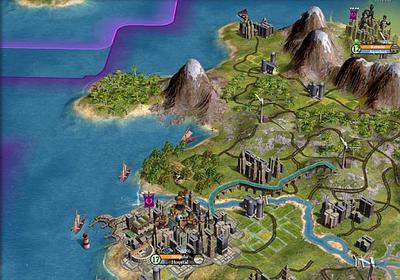
In a few hours, I should be sitting at home losing myself inside the world of Civilization IV. Fall and Civilization addiction has been a tradition for me for quite a few years now as Firaxis has had a penchant of releasing Civilization games and its expansion packs in three of the last four years during the October-November frame.
This fall I get to play with a new game. But it’s actually not all that new to me at all. I was lucky enough to have been invited by Firaxis to help test the game in its early stages and give them feedback. Although I was ultimately not able to participate as fully as I had hoped, what I saw in the few months around May and July excited me. This is why I’m so eager to get my hands on the completed final build and to continue giving feedback back to Firaxis in the post-release phase and beyond.
Playing Civilization games is an all-consuming passion for me. Like the history of civilizations, my passion waxes and wanes with time. I’m not always playing the games, but I am always a fan. Being a fan of Civilization is a bit like being a fan of a sports team. It’s an obsession in itself especially when the season is open and every other fan is going crazy. In the many active on-line communities, players debate over strategy, unit strengths and game balance in the same way a sports fan would talk about rival line-ups and play fantasy leagues. Others pour in countless hours of testing to discover the underlying mathematical algorithms that govern the games functions, and still others play the games in ways that push the boundaries of strategy and applying realpolitik into the game world.
Players also invest time into creating elaborate historical accounts of their games. Some are so well written that they rival in scope if not in quality real history texts. What these historical after-game-reports accomplish is in their ability to humanize the game’s many actors. The traditional Civilization game is a solitary single player experience played against a complex if ultimately predictable artificial intelligence where individual turns may take as long as an hour to complete. By putting the game into prose, the gamers give life and context to these game turns.
Rather than a series of uninteresting moves and countermoves between the player and the AI, the turns emerges as a story about clashing ambitions of rival nations fighting over pieces of land and resources, attempts at containment, alliances, cold wars, hot wars, historical enmities and the rise and fall of civilizations itself. These stories mirror real history but one that is taking place in a virtual planet.
In Civilization, players finish their games with a real sense of accomplishment. This isn’t Pinky and the Brain ‘conquer the world’ stuff. This game allows players to do immense good by unifying peoples, create great wealth, build wonders of the worlds and hold together a genuine lasting peace for eons, the likes of which our world has never seen. On the same coin, it also allows players to do immense evil.
Ultimately it is also about where the player’s intentions ultimately lay. The game certainly cannot recognize the subtle difference between abstract human concepts such as a warmongering player that rampages through neighbours in search of ultimate power, a peaceful defensive builder or a pragmatic player seeking to ‘win’ and grant its people prosperity and peace through limited wars and aggressive diplomacy. These are concepts only the human players can understand and apply in their games.
The wide-open nature of Civilization is its true genius. It allows players an open canvas in which they can repaint and reshape history in their own unique ways. Perhaps, in a small way, it also satisfies a little bit of the player’s own hubris. Everyone of us have a need to take control and to do what we consider is ‘good’ in our own way, rather than petitioning far off politicians or casting an insignificant vote in the electoral system. In Civilization, the players command populations, economies and armies. When all is said and done, the most successful players hold the fate of hundreds of millions of people in their hands. These may be mere numbers on the computer screen, but did Alexander, Emperor Qin, Caesar and Salahadin see their civilizations any differently? Theirs were also a civilization of numbers.
No comments:
Post a Comment